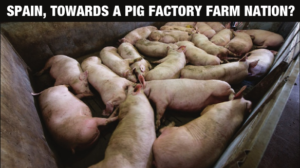Over the last few decades, small- and medium-scale farms raising livestock have given way to factory farms that confine thousands of cows, pigs and chickens in tightly packed facilities. Uncontrolled agribusiness power and misguided public policies have pressed livestock producers to become significantly larger and to adopt more intensive practices, which come with a host of environmental and public health impacts that are borne by consumers and communities.
Spain and its pork meat industry is a clear example, as we expose in a new report released today. Spain is the third largest exporter of pork after China and the United States and has the largest pig population in the EU—over 28 million animals. Production and exports are growing as a result of high industry consolidation and low production costs. But that means that the industry is getting concentrated in just a few hands, with the number of farms diminishing rapidly and farmers getting squeezed in the process. Between 1999 and 2013, 180,000 pig farms disappeared in the country, with a massive impact in rural communities.
The number of animals per farm has skyrocketed from an average of 122 in 1999 to 467 in 2013. Industry is moving away from traditional pig farming areas and getting close to the country’s main consumption centers and meat industries. This regional and corporate concentration has resulted in rising impacts on the environment, drinking water, animal welfare, and labour conditions.
Pigs in Spain produce around 61 million cubic metres of manure every year, an amount that could fill 23 times the FC Barcelona stadium. And there is a massive manure management problem. Unlike in cities, where human waste ends up at a sewage treatment plant, untreated livestock waste is flushed from confinement buildings into large lagoons. That manure often leaks or it is illegally dumped into local waterways, killing fish and spreading waste and odor across communities. The manure is applied to fields as a fertilizer, but when such applications exceed the ability of fields to absorb the nutrients, the residual nutrients (mostly nitrogen and phosphorus) and bacteria leach into groundwater and rivers.
In the region of Catalonia, nitrate pollution exceeds the regulatory limit in 41 percent of groundwater tables, and nitrate pollution has led to problems with access to drinking water in 142 of the region’s 947 municipalities. The Catalan government invests more than €6 million annually to provide clean drinking water to the affected population. The region of Aragon released 61 official alerts related to nitrate pollution in drinking water just in 2015. Media report spills and illegal discharges related to manure management all over the country. This situation is similar in many EU countries, where factory farms are the main culprit of nitrate pollution on water.
The Spanish pork industry is copying a factory farm model imported from the US, whose impacts have been exposed by our colleagues at Food & Water Watch. But as more and more factory farm projects are announced in the country, resistance is growing among communities that are suffering the impacts of this industry. There is an urgent need to rethink the Spanish development of the pork industry, so that farming can again be an activity that supports rural communities, meets consumer demands, and respects the environment and labour conditions.



